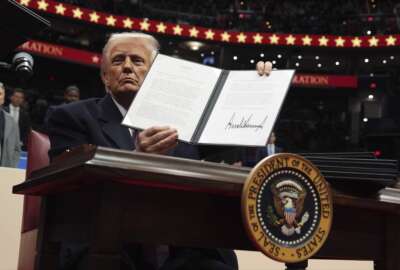House OKs DHS audit, lightens GAO load
The House this week approved a handful of bills aimed at improving federal financial management and oversight of government operations. Two of the bills — one...
The House this week approved a handful of bills aimed at improving federal financial management and oversight of government operations.
Two of the bills — one requiring the Homeland Security Department to pass a complete financial audit and the other lightening the mandatory caseload of the Government Accountability Office — have already been passed by the Senate and now head to the president’s desk for his signature.
The Department of Homeland Security Audit Requirement Target (DART) Act — introduced by Sens. Tom Carper (D-Del.), Scott Brown (R-Mass) and Ron Johnson (R-Wis.) — requires DHS to achieve a clean audit opinion by 2013. The agency announced last month it was audit-ready but has not actually passed a full-scope audit.
The Senate approved the measure late last month.
Bill cuts outdated GAO review
Carper, who was selected to be the next chairman of the Senate Homeland Security and Governmental Affairs Committee, also introduced the GAO Mandates Revision Act. The measure eliminates the number of mandatory reviews the agency is required to produce in outdated or irrelevant areas.
“This measure will streamline the requirements that Congress places on the Government Accountability Office, allowing this critical agency to focus its limited resources on its most important work and help Americans get a bigger bang for their buck,” Carper said in a statement.
For example, the bill directs GAO to review the Office of National Drug Control Policy national media-campaign efforts every three years, instead of annually. The bill also eliminates GAO’s review of textile imports under the 1983 Caribbean Basic Economic Recovery Act.
Sen. Susan Collins (R-Maine), a co-sponsor, cited the declining size of GAO’s workforce — it hit its lowest staffing levels since 1935 this year — as one reason for the changes.
“GAO is one of Congress’ most important partners and has faced difficult budget tightening in recent years. … It’s only fair that, as we ask the analysts to take on critical work to support our efforts in the legislative branch, we remove any requirements that no longer make sense,” Collins said in a statement.
On Thursday, the House also unanimously approved the Improper Payments Elimination and Recovery Improvement Act. The bill, introduced by Ranking Member Edolphus Towns (D-N.Y.), requires the Office of Management and Budget to single out federal programs prone to erroneous or fraudulent payments and provide greater oversight. In addition, the bill requires agencies to use a “Do Not Pay” tool to ensure funds are properly disbursed.
OMB says more than 4 percent of federal payments go to the wrong person, are in the wrong amount or were paid for the wrong reason. And in 2011, the Office of Personnel reported paying more than $600 million to deceased annuitants over the previous five years.
Carper also introduced the Senate version of the improper-payments bill, but it still requires further action there.
RELATED STORIES:
Senate votes to require DHS clean audit by 2013
Senate committee makes quick work of real property, Hatch Act bills
Copyright © 2025 Federal News Network. All rights reserved. This website is not intended for users located within the European Economic Area.





